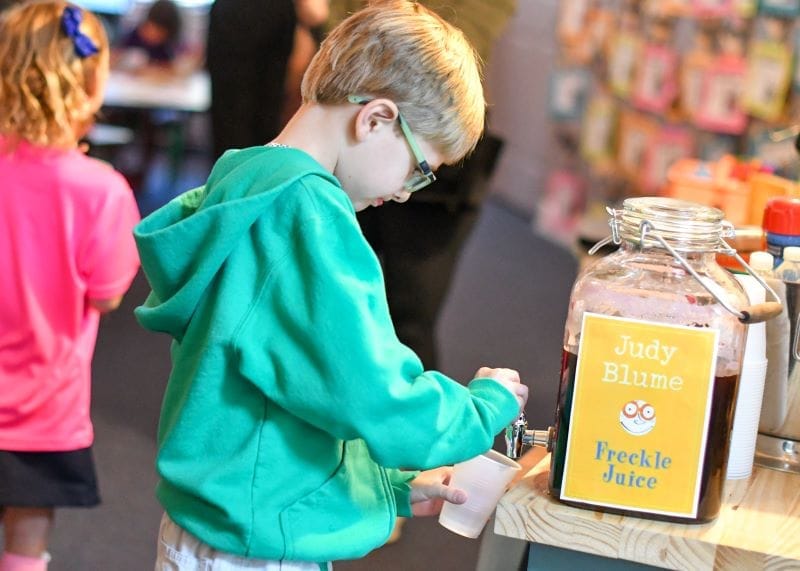Raising Readers in a Parent-Child Book Club
Starting a Family Book Club
At every table in the Corbett Prep Kindergarten Imagineers’ classrooms, parents and students sit together, engaged in discussions and activities centered on the characters, plot and setting of the first book they read together for the Chicka Chicka Book Club.
In its second year, the parent-child book club offers a fun and interactive way for families to share a love of reading and become more involved in their children’s education. Several times a year, teachers suggest a book families can enjoy at home and invite parents to Corbett Prep to participate in conversations about their reading.
Reading together is a valuable experience for families, encouraging empathy and emotional awareness and strengthening family bonds, in addition to bolstering language development.
A 2019 Ohio State study found that kids whose parents read a book a day to them will have heard about 290,000 more words by kindergarten than children without a regular reading habit. The words in books may also be different or more complex than what their parents would typically use, which expands children’s vocabulary and eventually helps them understand different types of text in school.
Books can also help children develop an appreciation for other cultures or lifestyles and teach them how to process complicated emotions as they read about characters facing challenges, according to the nonprofit Child Mind Institute. When parents and kids take time to read together, their relationship benefits from the focused time together free of distractions.
“We heard from so many parents who were looking for ways to support their child’s development,” says Corbett Prep kindergarten teacher Holly Ralph. “The Chicka Chicka Book Club encourages a lifelong love of books and learning and enhances communication skills by promoting discussion, critical thinking and verbal expression.”
Judy Blume’s “Freckle Juice” had the honor of being the inaugural book in Corbett Prep’s book club, and the clever story offered plenty of fun entry points for discussion among parents, students, teachers and classmates.
While students enjoyed swapping opinions about characters and the plot with their friends in class, a book club at home can accomplish many of the same goals. If you’d like to try one with your children, here are some suggestions for getting started.
Picking a Book
Chances are, your shelves at home are stocked with favorite books and books to grow into. But you can find plenty of inspiration online, such as the book-tracking app Goodreads, which keeps running lists of recommendations. The website Common Sense Media has a list of 50 books kids should read before 12, broken down by age with detailed reviews of each.
Scholastic maintains lists by age and explores popular series and seasonal themes. And the education website Edutopia curated lists from teachers with diverse books for all grade levels. Or take a field trip to your library or bookstore and see what the local experts suggest.
What to Talk About
If you’re reading side-by-side, you can start the conversation as you go before your official “meeting.” Ask your child before you turn a page or start a new chapter what they think will happen next or check in with them to see if they understood something that might have been confusing.
Once you’re done, brainstorm open-ended questions that go beyond “Did you like it?” Scholastic’s “Raise a Reader” blog offers up 5 different types of questions to ask, such as, “Which characters would you like to meet in real life” or “Would this make a good video game?”
Keep it Fun
For Corbett Prep’s “Freckle Juice,” families rotated through several stations featuring games, puzzles, worksheets and prompts for thought-provoking questions. Students even had a chance to get their own freckles and drink a tasty Freckle Juice concoction.
5At home, try special snacks or a themed dinner or a craft or game that ties into the book’s theme or setting. If there’s a movie version, you could have a movie night to spark additional discussions about the comparison.
Making book club fun helps kids see reading as an enjoyable activity rather than a school assignment. It also builds relationships and memories.
“This shared experience promotes bonding and reinforces the joy of reading,” Ralph says. “We hope it fosters a love of reading from an early age.”
RELATED:
- How to Find Books Your Kids Will Love
Middle School at Corbett Prep: Building Strong Foundations for Emotional and Academic Success
Finding Math in Unusual Places with Corbett Prep’s 8th Grade Class
*Presented by Corbett Prep | Originally published in the November 2024 issue of Tampa Bay Parenting Magazine.


